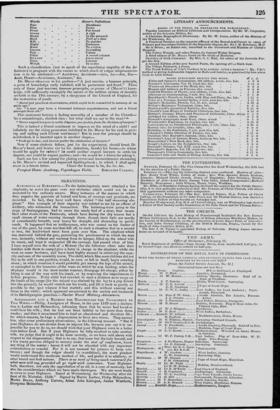GLEANINGS.
Axzcoores or ELEPHANTS.—To- the battering,-train were attached a few elephants, to assist the guns over any obstacles which could not be sur- mounted by the ordinary means. Many instances of the manner in which they express the, passions of hatred and love, of revenge and gratitude, are recorded. In fact, they have well been styled "the half reasoning ele- phant." One example of their sagacity was related to me by an officer of artillery, who witnessed the transaction. The battering-train going to the siege of Seringapatam, had to cross the sandy bed of a river, that resem- bled other rivers of the Peninsula, which have during the dry season but. a small stream of Water running through them, though their beds are mostly, of considerable breadth, very heavy for draught, and abounding in quick- sands. It happened that an artilleryman, who was seated on the limber of one of the gulls, by some accident fell off, in such a situation that in a second or two, the hind-wheel must have gone over him. The elephant which was stationed behind the gun, perceiving the predicament in which the man was, instantly, without any warning from its keeper, lifted up the wheel with its trunk, and kept it suspended till the carriage had passed clear of him.
I have myself seen the wife of a Mohaut (for the followers often take their families with them to camp) give a baby in charge to the elephant, while she went on some business, and have been highly amused in observing the saga- city and care of the unwieldy nurse. The child, which like most children did not like to lie still in one position, would, as soon as left to itself, begin crawling about ; in which exercise it would probably.get among the legs of the animal, or entangled in the branches of the trees on which he was feeding, when the elephant would in the most tender manner, disengage his charge, either by lifting it out of the way with his trunk, or by removing the impediments to itsfree progress. If the child had crawled to such a distance as to verge on the limits of his range (for the animal was chained by the leg to a peg driven into the ground), he would stretch out his trunk, and lift it back as gently as
possible to the spot whence it had started ; and this without causing any alarm to the child ; which appeared accustomed to the society and treatment of its Brobdignagian guardian.—Twelve Years Military Adventures.
AUTHORITIES AND A RECEIPT FOR RECONCILING THE CONSCIENCE TO
Two Wives.—Philip, Landgrave of Hesse, in the year 1539 sent a declara- tion to Luther and Melancthon, informing them that he never had loved or could love his wife ; that he had not been faithful to her more than three weeks ; and that it occasioned him to lead an abandoned and dissolute life; for which reasons, he begs a dispensation to have two wives. They answer him, after some preliminary observations, in the following manner. " But if your Highness do not abstain from an impure life, because you say it is im- possible for you to do so, we should wish that your Highness were in a better state before God. But if your Highness be fully resolved to take another wife, we judge that it ought to be done secretly, as we have said above with respect to the dispensation ; that is to say, that none but the lady herself, and a few trusty persons obliged to secrecy under the seal of confession, know any thing of the matter : hence it will not be attended with any important contradiction or scandal. For it is not unusual for princes to keep mis- tresses; and though the vulgar should he scandalized, the more prudent would understand this moderate method of life, and prefer it to adultery, or other brutal and foul actions. There is no need of being much concerned fear what men will say, provided all go rigid with conscience. Your Highness bath, therefore, not only the approbation of us all, in a case of'necessity, but also the considerations which we have made thereupon. We are most ready to serve to your Highness. Dated at Wirtemberg, the Wednesday after the feast of St. Nicholas, 1539." Signed by Martin Luther, Philip Melanctbon, Martin Bucer, Anthony Corven, Adam John Linin,gue, Justus Wintforte, Dionysius Melanther.


















 Previous page
Previous page